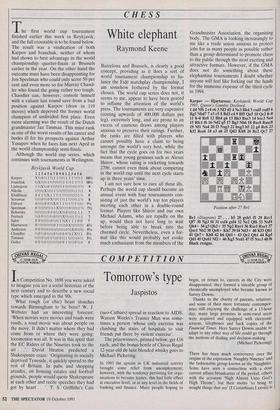12 YEAR OLD SCOTCH WHISKY
COMPETITION
12 YEAR OLD SCOTCH WHISKY
Tomorrow's type
Jaspistos
In Competition No. 1698 you were asked to imagine you are a social historian of the next century and to describe a new social type which emerged in the 90s.
What rough (or chic) beast slouches towards Birmingham to be born? W. J. Webster had an interesting forecast: 'When movies were movies and roads were roads, a road movie was about people on the move. It didn't matter where they had come from or where they were going: locomotion was all. It was in this spirit that the EC Riders of the Nineties took to the air . . .'. David Heaton predicted a Shakespeare craze: 'Originating in socially deprived Tyneside, it quickly spread to the rest of Britain. In pubs and shopping arcades, on housing estates and football grounds, people would quote Shakespeare at each other and recite speeches they had got by heart . . .'. T. S. Griffiths's Cats (neo-Cathars) spread in reaction to AIDS. Watson Weeks's Trainer Man was some- times a person 'whose only exercise was climbing the stairs of hospitals to visit friends put there by violent exercise'.
The prizewinners, printed below, get £16 each, and the bonus bottle of Chivas Regal 12-year-old de luxe blended whisky goes to Michael Pickering.
In 1993 the upturn in UK industrial activity brought some relief from unemployment; however, with the tendency persisting for orga- nisations to become leaner, this had little effect at executive level, or at any level in the fields of banking and finance. Many people hoping to
begin, or return to, careers in the City were disappointed; they formed a sizeable group of chronically unemployed who became known as Surrey Downs.
Thanks to the charity of parents, relatives, and some of their more fortunate contempor- aries still enjoying the challenge of a 13-hour day, many large premises in semi-rural areas were acquired and equipped with electronic screens, telephones and back copies of the Financial Times. Here Surrey Downs unable to adapt to any other way of life could go through the motions of dealing and decision-making.
(Michael Pickering)
There has been much controversy over the origins of the expression 'Naughty Nineties' and the fashionable group known as the Naughties. Some have seen a connection with a dour current affairs broadcaster of the period, others with the acronym 'Nigh Almost Unto God's High Throne'; but their motto 'to bring to nought things that are' (I Corinthians I.xxviii) IS
the likeliest source.
They differed from the 'Flower Children' of twenty years earlier in their immaculate dress and restrained behaviour, and from previous illennarians in abjuring flagellation and fast- ing. Instead, setting at nought the materialism of the age, they prepared for the Second Coming by devoting themselves exclusively to acts of Politeness: smiling, opening doors, giving up their Underground seats and — most curiously — handing around cream cakes to the mantra 'Naughty but Nice'. (Inevitably, there were complaints that a perfectly respectable word had been hijacked by a minority pressure group.) (M. R. Woodhead) During the early 1990s no one did more for Europeanisation than the employees of British companies who lived in the United Kingdom but worked on the Continent. This was a paradox, because their countrymen loathed them. They were known in current jargon as Europrats; they had lost all their friends by being able to speak to the au pair in her own language; they bored their acquaintances by talking familiarly of continental cities which their hearers had only visited on package tours; they annoyed everyone by pretending they had forgotten English words and substituting foreign ones. Eventually they Went to live in Europe, and were popularly supposed to have exchanged the rigours of
Britain for la dolce vita.
The paradox lay in the fact that since the loathing was the result of envy, more and more people decided to emulate them, so that in a few short years Britain was truly part of Europe.
(D. Shepherd)
First-worlders were part of the anti- environmentalist backlash of the mid-Nineties. Intelligent young neo-yuppies, bored with the decade's clean-living orthodoxies, they were committed smokers and carnivores: high-tar cigarettes were de rigueur and in 1995 there was even a spate of ideologically inspired attacks on vegetarian restaurants. First-worlders wore a brand of denims produced in third-world sweat- shops (wittily marketed as 'The Selfish Jean') and T-shirts that announced WHO NEEDS RAIN- FORESTS ANYWAY? or WHAT HAVE DOLPHINS EVER DONE FOR ME? Fur coats, back in fashion, featured a prominent 'genuine endangered spe- cies' label. First-wonders were generally apoliti- cal (every mainstream party having gone green), but when a group of mavericks headed by chain-smoking Nick Ridley and John Gum mer — who had famously force-fed his children with beefburgers in the late 80s — attempted to harness the anti-green vote they came close to holding the balance of power in the disastrous 'PR Parliament' of 1996.
(Peter Norman) 1997 saw the terrifying rise of the `Schoolies' or 'Clarkies', gangs of young men and women who, clad in jeans and trainers, black gowns and mortar-boards, armed with encyclopaedias and whippy canes, roamed the streets in search of 'Iggies', who would be subjected to tests on factual information and, if they failed to achieve an arbitrary score (usually 60 per cent), severely beaten on hands and buttocks. Later they would burst into snooker halls and amusement arcades, submitting customers and staff to their brand of academic mohawkisrn. By June 1998 there was no refuge. The bands grew in numbers and, in rigour and would rampage through libraries and museums, attacking both young and old. Even church services were not sacrosanct; indeed a higher 'pass mark' (75 per cent) was imposed on ministers of religion. It was not until March 1999, when the then Education Secretary was publicly thrashed, that legislation to curb them



























































 Previous page
Previous page